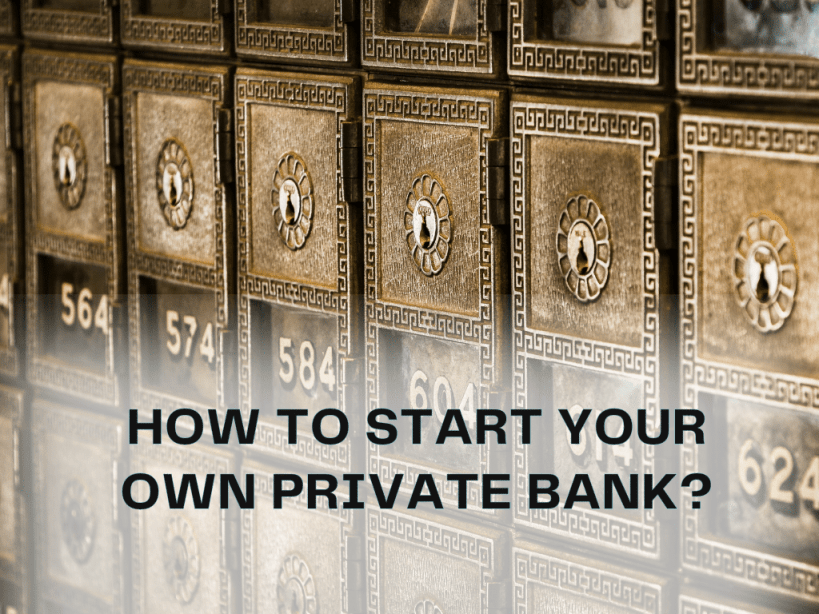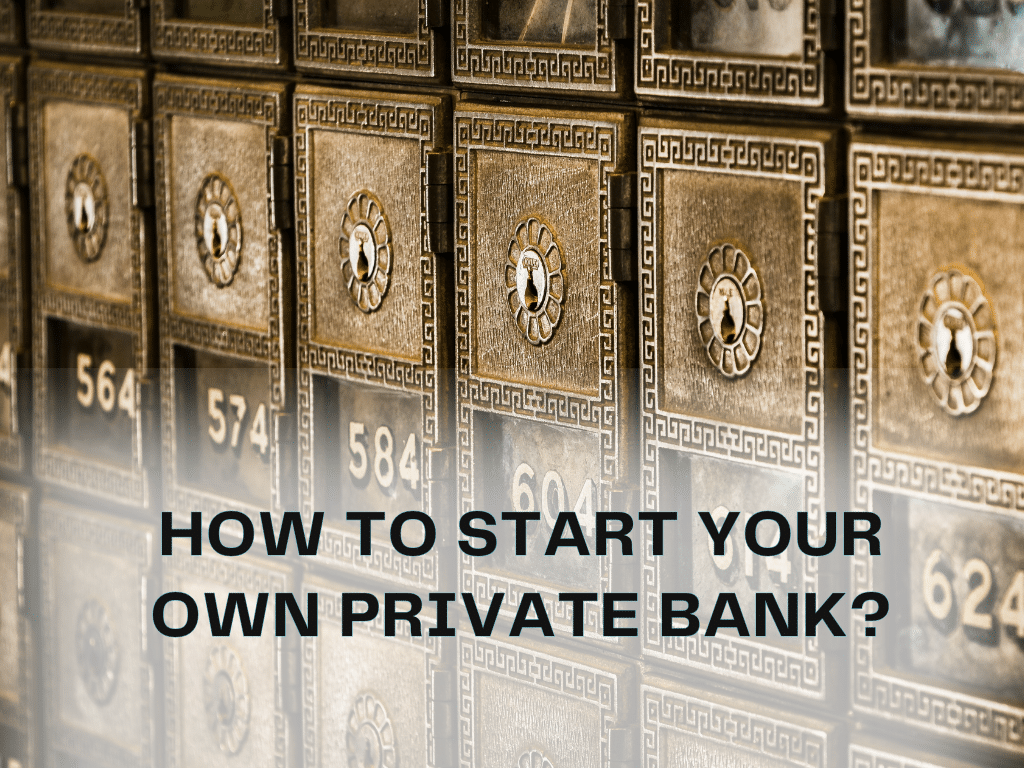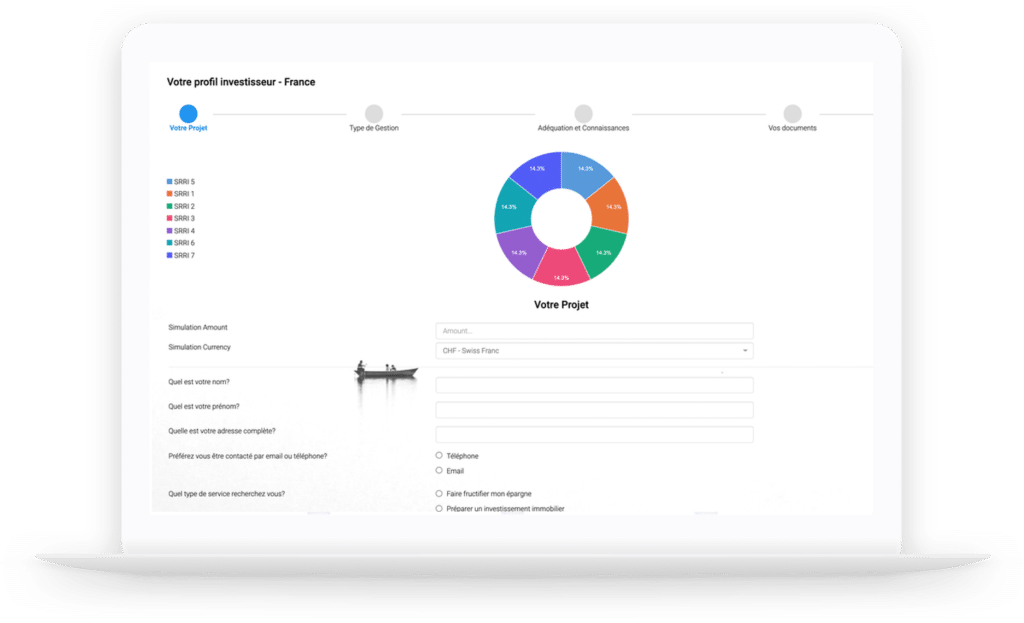How to Start your Own Private Bank?


Establishing your own bank may seem daunting, but with proper planning and execution, it can be a manageable process. According to the World Bank’s Global Financial Development Database, as of 2021, there were 12.3 commercial bank branches per 100,000 adults worldwide, reflecting the extensive reach of financial institutions globally.
Starting a private bank offers several benefits, including enhanced privacy and greater control over your finances. A report from PwC projects that global assets under management (AUM) are expected to reach $171 trillion by 2028, reflecting a compound annual growth rate of 5.9%.
In this blog post, we’ll guide you through the steps necessary to start your own private bank. Follow these simple tips, and you’ll be on your way to financial independence in no time!
Research the banking industry.
Before you start your own private bank, it is essential to do thorough research into the banking industry and the regulations you must abide by in order to ensure the safety and security of your customers’ funds. This research can include reading applicable legal guidelines, consulting with experts in finance and economics, and learning about local banking regulations. To make sure everything falls within Compliance Standards, you must thoroughly familiarize yourself with the state and federal rules that govern banks. Although this may prove to be a long and arduous process, researching ahead of time makes compliance much simpler once your bank up and running – ensuring that your business has a secure foundation on which to grow.
Building a bank is a challenge by itself and we always tell new prospects to stay as light as possible on the code endeavours. Building code is difficult as there are many pitfalls and the learning curve is steep. Hire a team of professionals to help you set up your bank and ensure everything runs smoothly.
Secure an appropriate location for your bank, get licensed as a business, and apply for a banking charter from the state.
Once you have completed your research, it’s time to find a suitable location for your bank. You will need to get licensed as a business and apply for a banking charter from the state in order to open your bank. It’s important to make sure that you are properly registered with all of the necessary government agencies before you start operations. Banks face enough issues and InvestGlass has building codes to run your private bankers. The system is flexible to start a bank. Yet in the past few years, we build the best SAAS solution for banks.

Develop your bank’s technology infrastructure and establish policies to protect customer data and funds.
Once you have obtained the necessary licensing and secured an appropriate location, you can begin building your bank’s technological infrastructure. Make sure that your security protocols are top-notch in order to protect customer data and funds.
Create a business plan.
Starting your own private bank can be an exciting entrepreneurial endeavor, but it requires diligent planning and good decision-making. When considering how to create a successful private bank, first and foremost a comprehensive business plan is a must-have. This plan should include how you will raise capital – such as through investments or financing – and what services you will offer to both consumers and businesses. Taking each step one at a time is the best approach; focusing on the details where you can find economies of scale, endeavoring to acquire the necessary licenses, considering locations that are ideal for those who need quick access, and working with an excellent team of advisors will all help ensure success. Together they will make it possible to start your own private bank and desirable private banking palace in no time!

How Much Does It Cost to Start a Bank in the Europe or the US?
Starting a bank is a significant financial endeavor. The initial setup costs typically range from $500,000 to $1 million. These expenses cover various requirements, including legal and regulatory fees.
In addition to the setup costs, you’ll need to secure substantial capital, typically between $10 million and $30 million. This capital is essential to meet regulatory requirements and ensure your bank’s financial stability.
How Much Does It Cost to Start a Bank Offshore?
Starting an offshore bank involves substantial financial commitments, which can vary based on location and requirements. Here’s a breakdown of the costs you might expect:
- Initial Setup Costs: Typically, establishing an offshore bank requires an investment ranging from $150,000 to $250,000. These costs cover essential steps such as legal fees, registration, and administrative expenses.
- Capital Requirements: Beyond the initial setup, you must also have $1 million in capital. This capital is crucial as it serves as a protective buffer, ensuring the security and trustworthiness of depositor funds.
The actual costs can fluctuate depending on the jurisdiction chosen. Each location has its own regulations and financial obligations, which can influence the total investment needed. It’s important to perform detailed research or consult with financial experts to understand the full scope of starting an offshore bank and ensure compliance with local laws.
Obtain the necessary licenses and permits.
When you start your own private bank, it can requires many steps and actions, including obtaining necessary licenses and permits from the government. Depending on the type of government you are working with, as well as the structure of your bank, there may be various regulations in place that must be satisfied before you can gain approval. Additionally, each license and permit comes with its own set of requirements which must be met to the letter in order to ensure the smooth operation of the bank after it is established. These processes can take time, but they are ultimately essential in ensuring an operating environment that is both compliant and compliant-minded; setting yourself up for success in running a successful and profitable banking venture.
Find a suitable location for your bank.
When you start your own private bank, finding the right location is important for both safety and visibility. Think about access to public transportation, and consider foot traffic in the area. High-density areas such as downtowns or shopping malls might make it more likely that customers will find you. If a prospective location is slightly out of the way, make sure to attract customers by highlighting features that they would appreciate such as free parking or specialized services. Keep in mind that banks need to have good security measures, so check if the building has adequate surveillance and proper access control systems like access cards and biometric readers. Taking all these factors into consideration can help you identify a suitable location for your private bank.
Financial institutions are using the same KYC rules to open a bank account. One should be careful in the niche market as KYC can be difficult and costly. Wealthy individuals can be PEP. PEP is considered high-risk individuals. You need to be informed about the current laws and regulations regarding PEPs, as well as their varying interpretations around the world. I would say here a minimum balance – maybe not… but prospect quality yes. You don’t want to start a new business and provide access to crooks. Lower fees and risk your bank’s reputation…
Financial institutions are increasingly using an established set of Know Your Customer (KYC) rules and regulations whenever opening new accounts. However, private banks that operate in niche markets may find these KYC requirements more challenging, as their customers’ financial profiles can be outside the traditional parameters. As such, it is important to carefully consider any potential customer before opening an account and make sure that both the customer’s financial profile and the bank’s risk management system is in line with applicable KYC regulations. By doing so, private banks can ensure a safe and compliant environment for their customers and themselves.

Hire qualified staff to help run your bank.
Starting your own private bank is an exciting endeavor, but it’s important to make sure that you have the right people in place to ensure it runs smoothly. For most banks, this means hiring qualified staff such as tellers to handle deposits and cash withdrawals, loan officers to help manage loan applications and accounts, and customer service representatives to deal with any customer inquiries or issues. Each of these roles should be filled with knowledgeable and experienced professionals who can provide quality assistance with various aspects of operating and running a successful financial institution. With the right staff in place and a dedicated commitment to top-notch customer care, your bank can start on the right track toward success.
InvestGlass portfolio management software is built for automated wealth management. We believe that artificial intelligence is the only key to new bank profitability. We have pre-built connections to anti-money laundering software and work with established banks in Switzerland and GCC.
InvestGlass is a holistic and fully automated portfolio management software that combines multiple features to enable advisors to deliver a comprehensive wealth management experience for their clients. Our state-of-the-art AI technology allows advisors to quickly manage client portfolios, track market performance, create comparative reports, and develop strategies to maximize returns.
AI can be used to give the impression that you have a dedicated banker. Online banks typically use chat tools, AI algorithms, and virtual reality to create an immersive customer service experience.
Using the power of artificial intelligence (AI) and recently ChatGPT, you can provide your customers with a personalized banking experience that feels as if they are working with a dedicated banker. You can see below how we added ChatGPT to facilitate bankers and sales day to day sales process.
Opening bank account for online banks.
is also important to provide customers with secure and convenient ways to manage their finances. Your mobile banking app is needed if you wish to address new potential customers with low onboarding costs. A payment account or savings account can be built with InvestGlass with no coding knowledge.
In order for customers to access your banking services online, you must first offer them the opportunity to open an account with your bank. This will involve setting up the necessary infrastructure to securely process customer applications, as well as providing various features such as encrypted passwords, two-factor authentication, and other security protocols. Additionally, you’ll need to ensure that users can easily view their balances, make payments and transfers, set up automatic payments, and keep track of all financial activities through an online banking platform. InvestGlass can be easily customizable for a particular community of clients. This can facilitate the efficient management of accounts and enable customers to access their funds quickly and securely.
We have been building templates for the following segments:
- Islamic banks
- small business banks
- personal assets banks
- high net worth individual bank
- family office turning into new banks
- group of a private banker or EAM
- startup bank
- life insurance policies distributor
- high net worth individuals bank
- employees’ savings accounts structure
- scalable wealth management firms
- Cross-border private banking clients
- wire transfers portal
- mutual funds platform
- real assets – investable assets portfolio
We can help you with helpful tips when you start your own private bank, but you will have to ask a lawyer to create your dossier to be sent to your local regulator. We will share with you a potential competitive advantage as we are building banks in several countries. If we believe that it could be to difficult to address a target market, we could tell you that it might be wiser to be a certified financial planner instead or a bank owner. Moving from a small bank to an established bank requires a lot of paperwork, but you have to make sure that the bank is compliant with regulators.

We understand that the success of a financial institution starts with its staff. InvestGlass provides tools and resources to help you find and retain qualified personnel who are passionate about investing. Owning a bank is a demanding endeavor. It requires intimate knowledge of the banking industry and regulatory structure of the financial services industry.
InvestGlass digital onboarding tool is made for online bank onboarding. It helps you get your account opened by customers, who then can start trading and investing in no time. Our onboarding process is secured, automated and compliant with all the necessary regulations. InvestGlass offers a wide range of features such as digital KYC, application forms management and fraud detection to make sure that customers have a smooth and secure onboarding experience.
Navigating U.S. or Europe Banking Regulations: What to Expect
Establishing a chartered financial institution within the Europe or the US is a complex endeavor, primarily due to stringent regulations and a thorough application process. Both the federal and state governments play a crucial role in overseeing the banking sector, ensuring it operates under strict compliance standards.
The Application Process
- Licensing and Charters: In Europe, aspiring banks must secure a license through either a federal or state charter. This process involves submitting a detailed application that undergoes comprehensive evaluation.
- Rigorous Screening: Applications are meticulously scrutinized by regulatory bodies. This examination covers not just the surface details but delves deeply into the bank’s future leadership, operational plans, and more.
- Comprehensive Review:
- Senior Officers and Business Plans: Regulatory agencies assess every senior officer’s qualifications alongside the robustness of the business plan. This ensures potential issues are identified and mitigated early.
- Background Checks: Fingerprinting and exhaustive background audits are standard to prevent any misconduct risk.
- Financial Projections and Policies: These are carefully analyzed to check the feasibility and sustainability of the bank’s operations.
Documentation and Community Focus
Creating a solid foundation for a financial institution involves extensive paperwork. This includes:
- Detailed financial forecasts.
- Notarized signatures for crucial documents.
- Bank policy statements reflecting compliance and customer service priorities.
Beyond just fulfilling regulatory requirements, applications should demonstrate a dedication to community enrichment. A bank’s strategy should highlight benefits to the community, not merely prioritize its profitability.
Regulatory Oversight
The banking industry’s regulatory environment adds a layer of security for investors and customers alike. By strictly monitoring banks, regulators help ensure that financial institutions remain both lucrative and reliable.
In summary, the European or U.S. Banking application process is designed to protect consumers and maintain the stability of the financial system by imposing rigorous checks and fostering institutions that contribute positively to their communities.
How Long Does It Take To Start Your Own Private Bank?
Starting your own bank is an intricate and time-intensive process. On average, it may take between 12 to 18 months to fully establish a bank. This timeline can vary significantly based on several factors, including regulatory requirements, preparation, and your team’s experience level.
Key Steps and Timeframes:
- Initial Planning and Research (3-6 months):
- Conduct thorough market research to understand the demand and competition.
- Outline a comprehensive business plan, including your bank’s mission, target market, and financial projections.
- Regulatory Approval (6-12 months):
- Apply for a banking charter. The approval process with regulatory bodies.
- Submit detailed documentation outlining your bank’s structure, including capital requirements and risk management strategies.
- Organizational Setup (3-6 months):
- Establish your legal entities, including the bank itself and any holding companies.
- Hire key personnel, like the executive team and board members.
- Infrastructure Development (2-4 months):
- Set up physical locations, secure necessary equipment, and install technology systems for operations and security.
- Develop and test your IT systems, including online banking platforms and customer service technologies.
- Final Preparations and Soft Launch (1-3 months):
- Conduct staff training and finalize operational procedures.
- Implement marketing strategies to attract your initial customer base.
Throughout this process, factors like the efficiency of your legal team, the complexity of regulatory compliance, and your financial readiness can affect the overall timeline. Proper planning and preparation are crucial to avoid delays.
How Can a Finance Company Be an Alternative to Starting a Traditional Bank?
Starting a conventional bank often involves navigating a labyrinth of regulations, substantial capital requirements, and lengthy approval processes. In contrast, forming a finance company offers an appealing alternative with several distinct advantages.
Quicker Setup and Lower Costs
- Time Efficiency: Establishing a finance company can take just a few weeks, significantly faster than the months or even years required to start a traditional bank.
- Cost Savings: The financial burden is lighter, as the initial setup and operational costs are substantially lower than those associated with a fully licensed bank.
Regulatory Advantages
- Simplified Compliance: Unlike banks, a finance company is not subject to the stringent regulatory oversight of central banking authorities. Instead, compliance typically involves adhering to broader legislative acts related to financial transactions and monetary law. This results in less bureaucratic red tape and more freedom to innovate.
Operational Flexibility
- Tailored Services: Finance companies can offer specialized financial services such as lending, credit lines, and financial advisory without being constrained by traditional banking product offerings.
- Niche Market Focus: They can easily target specific sectors or demographics, adapting services to meet the unique needs of these markets more swiftly than traditional banks.
By choosing to establish a finance company, entrepreneurs can leverage these benefits to create a nimble, cost-effective financial service platform. This approach not only bypasses the intricate regulatory framework of conventional banking but also opens up opportunities to serve untapped markets.
Promote your bank through marketing campaigns.
Starting a private bank is an ambitious financial endeavor that requires proper planning, funding and effort to get off the ground. Marketing campaigns and word-of-mouth advertising are powerful tools to create a successful start for your private bank. Through creative promotions and well-crafted messaging, you can help capture people’s attention and interest in your new venture. Additionally, utilizing the influence of existing networks of family, friends and colleagues can be a great way to help spread the word about your business’s launch. Even if it requires some extra work on your part, these types of marketing tactics can be invaluable when it comes to getting your private bank noticed in an increasingly competitive financial market.
When done correctly, starting your own private bank can be a very lucrative endeavor. However, it is important to do your research and understand the regulations that you need to comply with in order to avoid any legal trouble down the road. Creating a solid business plan is also essential, as this will determine how successful your bank ultimately becomes. Once you have all of the necessary licenses and permits in place, finding a good location for your bank is key. And finally, hiring qualified staff and promoting your bank through marketing campaigns are both important pieces of the puzzle. If you’re looking for the best tool to help you start your private bank, look no further than InvestGlass! The world of “dedicated private banker” is possible thanks to AI. Let us show you how!
Final Thoughts
We can see the process of start your own private bank requires careful planning, regulatory approval, and the right technology. You need a strong business model, sufficient capital, and compliance with financial regulations. Choosing the right banking software can streamline operations and ensure security. InvestGlass provides tools to help you launch and manage your private bank efficiently. From CRM to portfolio management, our platform simplifies banking operations. Get started for free today.